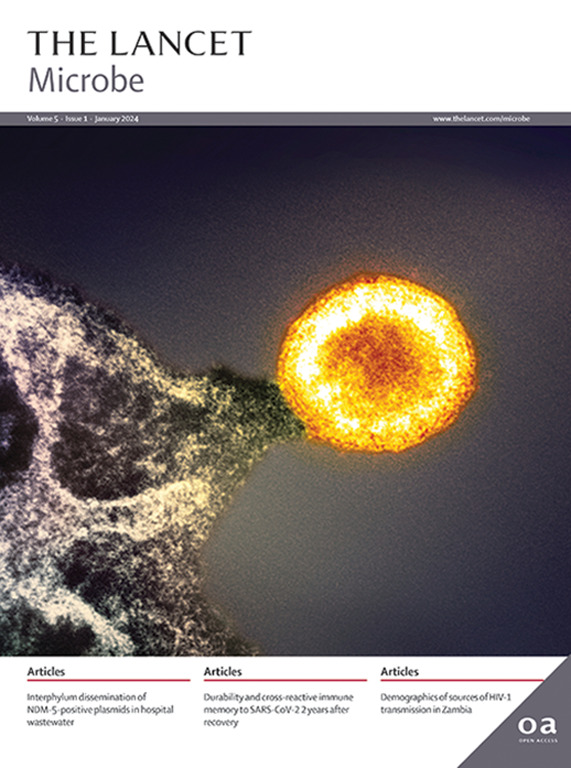ibezapolstat与万古霉素在成人艰难梭菌感染中的疗效、安全性、药代动力学和相关微生物组变化:一项2b期、随机、双盲、主动对照的多中心研究。
IF 20.4
1区 生物学
Q1 INFECTIOUS DISEASES
引用次数: 0
摘要
背景:艰难梭菌感染是一种常见的卫生保健相关和社区获得性疾病,很少有抗生素治疗选择。我们的目的是评估ibezapolstat(一种抑制polc型DNA聚合酶III α亚基C的抗生素)与万古霉素治疗成人艰难梭菌感染的安全性、有效性、药代动力学和相关微生物组变化。方法:这是一项2b期、随机、双盲、主动对照研究,在美国15个中心进行,主要是门诊诊所和医院。年龄在18-90岁之间,有艰难梭菌感染的体征和症状,并且粪便毒素测试呈阳性。参与者被随机分配(1:1),通过研究站点使用交互式网络响应系统进行分组分配,接受口服伊贝扎泊司他(450 mg,每日两次)或口服万古霉素(125 mg,每6小时),持续10天。掩蔽是通过将研究药物(ibezapolstat和万古霉素)和安慰剂过度包封在相同大小的胶囊中来实现的。如果受试者在第一次给药前接受了超过24小时的口服万古霉素、非达索霉素或甲硝唑治疗当前的艰难梭菌感染,或在48小时内接受了任何其他抗菌治疗,在过去12个月内有过3次以上的艰难梭菌感染,或在过去3个月内有过1次以上的艰难梭菌感染(不包括当前的感染),则受试者被排除在外。主要疗效终点是治疗结束后保持至少48小时的初始临床治愈。所有符合纳入和排除标准的艰难梭菌感染个体被随机分配,并给予至少一剂研究药物,纳入疗效分析。在所有接受至少一剂研究药物的个体中,对伊贝扎泊司他的安全性和耐受性进行了评估。本研究已在ClinicalTrials.gov注册,编号NCT04247542。研究结果:在2021年3月12日至2023年10月27日期间,对39人进行了资格评估,其中32人被招募并随机分配到伊贝扎泊司他(n=18)或万古霉素(n=14)组。两名受试者被排除在疗效分析之外:伊bezapolstat组的一名受试者在接受研究药物前撤回了同意,另一名受试者在随机分配后被确定为具有排除标准。初步疗效分析包括伊贝扎泊司他组16例,万古霉素组14例;24名(80%)参与者为女性,6名(20%)参与者为男性。伊bezapolstat组16名患者中有15名(94%)初步临床治愈,而万古霉素组14名患者中有14名(100%)初步临床治愈(治疗差异为- 6.3% [95% CI - 30.7至19.4];p = 1·0)。依bezapolstat耐受性良好,安全性与万古霉素相似。两组均未发生药物相关严重不良事件、药物相关治疗停药或治疗相关死亡。解释:依bezapolstat是一种革兰氏阳性选择性谱抗生素,在治疗初始艰难梭菌感染和预防复发方面显示出潜力。进一步的临床研究是必要的。资助:Acurx制药公司。本文章由计算机程序翻译,如有差异,请以英文原文为准。
Efficacy, safety, pharmacokinetics, and associated microbiome changes of ibezapolstat compared with vancomycin in adults with Clostridioides difficile infection: a phase 2b, randomised, double-blind, active-controlled, multicentre study
Background
Clostridioides difficile infection is a common health-care-associated and community-acquired disease with few antibiotic treatment options. We aimed to assess the safety, efficacy, pharmacokinetics, and associated microbiome changes of ibezapolstat, an antibiotic that inhibits the PolC-type DNA polymerase III α subunit C, versus vancomycin for the treatment of C difficile infection in adults.
Methods
This was a phase 2b, randomised, double-blind, active-controlled study conducted at 15 centres, primarily outpatient clinics and hospitals, in the USA. Adults aged 18–90 years, with signs and symptoms of C difficile infection and a positive toxin stool test were recruited. Participants were randomly assigned (1:1) with block assignment by study site using an interactive web response system to receive oral ibezapolstat (450 mg twice daily) or oral vancomycin (125 mg every 6 h) for 10 days. Masking was achieved by over-encapsulation of both study drugs (ibezapolstat and vancomycin) and placebo into identically sized capsules. Participants were excluded if they had received more than 24 h of treatment with oral vancomycin, fidaxomicin, or metronidazole for the current episode of C difficile infection before the first dose of study drug or any other antibacterial therapy within 48 h, had had more than three episodes of C difficile infection in the previous 12 months, or had had more than one previous episode in the past 3 months (excluding the current episode). The primary efficacy endpoint was initial clinical cure maintained for at least 48 h after the end of treatment. All individuals with C difficile infection who met inclusion and exclusion criteria, were randomly assigned, and were administered at least one dose of study drug were included in the efficacy analysis. The safety and tolerability of ibezapolstat was assessed in all individuals who were administered at least one dose of study drug. This study is registered with ClinicalTrials.gov, NCT04247542.
Findings
Between March 12, 2021, and Oct 27, 2023, 39 individuals were assessed for eligibility, 32 of whom were recruited and randomly assigned to ibezapolstat (n=18) or vancomycin (n=14). Two participants were excluded from the efficacy analysis: one participant in the ibezapolstat group withdrew consent before receiving the study drug and another was identified after random assignment as having an exclusion criterion. The primary efficacy analysis included 16 participants in the ibezapolstat group and 14 in the vancomycin group; 24 (80%) participants were female and six (20%) were male. 15 (94%) of 16 participants in the ibezapolstat group had initial clinical cure compared with 14 (100%) of 14 participants in the vancomycin group (treatment difference −6·3% [95% CI −30·7 to 19·4]; p=1·0). Ibezapolstat was well tolerated with a safety profile similar to vancomycin. No drug-related serious adverse events, drug-related treatment withdrawal, or treatment-related deaths occurred in either group.
Interpretation
Ibezapolstat is a Gram-positive selective spectrum antibiotic that shows potential in the treatment of initial C difficile infection and prevention of recurrence. Further clinical development is warranted.
Funding
Acurx Pharmaceuticals.
求助全文
通过发布文献求助,成功后即可免费获取论文全文。
去求助
来源期刊

Lancet Microbe
Multiple-
CiteScore
27.20
自引率
0.80%
发文量
278
审稿时长
6 weeks
期刊介绍:
The Lancet Microbe is a gold open access journal committed to publishing content relevant to clinical microbiologists worldwide, with a focus on studies that advance clinical understanding, challenge the status quo, and advocate change in health policy.
 求助内容:
求助内容: 应助结果提醒方式:
应助结果提醒方式:


